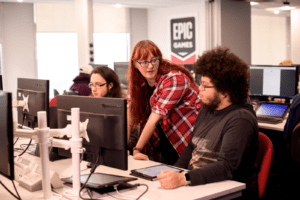Digital technology and computer games have the potential to transform Stoke-on-Trent city centre in a hugely positive way – and the BID is determined to make that vision a reality.
Written by Jenny Amphlett
Computer games have long been thought of as taking people away from town and city centres to play in solitude at home. Stoke-on-Trent City Centre BID is turning that concept on its head with innovative, world-leading plans that could see digital technology attract visitors to the city centre, create jobs and improve the local economy.
This isn’t a fanciful idea for some indeterminate time in the future – it starts right now with the Stoke ON TREND GamesJam 2021. An event that is believed to be a world first.
They may sound like something that happens if you drop a piece of toast while playing Monopoly – but games jams have become a hugely popular global phenomenon. Now the BID has joined forces with Staffordshire University to stage what’s believed to be the world’s first games jam based around city centre heritage locations.
It will see people from across the globe offered the chance to design a game based on the city of Stoke-on-Trent. Members of the public will then be able to access and play the games by visiting specific places in the city centre.
At least 500 games designers are expected to take part with more than 150 games created.
A potentially life-changing prize will see the overall winner or winners work with Staffordshire University’s games experts to refine their game then launch it commercially.
Jonathan Bellamy, Chairman of Stoke-on-Trent City Centre BID, hopes the games jam will be just the start of a series of collaborations between the university and the city centre.
For Jonathan it isn’t just about increasing footfall for the city centre; it’s about engaging with young people, encouraging Staffordshire University’s games graduates to want to stay in the area and also harnessing digital technology for the good of the city and its economy.
“Staffordshire University is the best in the country when it comes to games courses, double the size of any other university,” says Jonathan. “They’re an incredible resource and they’re doing a fantastic job in terms of digital excellence. We knew we had to talk to them.
“Something like this is particularly appropriate for youth and young adults to come and participate in but more than that we expect families to take part and at the same time use the hospitality venues and get to know something of the heritage.

“We’re bringing games jams from the bedroom to the high street. That’s what’s unique about it, as a city centre we’re looking at how to engage with this form of entertainment and make it applicable for a city centre.”
Jonathan believes digital technology is vital for the future of a developing city centre and that this is an area where Stoke-on-Trent city centre can be a pioneer.
“Longer term we’ll be looking at how we can work with some of our excellent creative, digital businesses locally to have more of an ongoing daily digital provision in the city centre. Hopefully we’ll be announcing more on that later in the year.”
“It all came about as part of a plan to build on Stoke-on-Trent’s national reputation as a centre for games and esports,” says Dr Bobbie Fletcher, head of Staffordshire University’s games and visual effects department.
“We’ve had really successful games courses at Staffordshire University since 2004, when we started with 55 students. We have nearly 2,000 students on games courses now, considerably more than any other university in the UK.
“We’ve been doing games jams for years at the university and have had some of the biggest games jams in Europe, but what we haven’t done before is take it into the city centre.”
Bobbie believes this will be the first games jam in the world to be based around heritage locations within a city centre, with the aim of encouraging people to explore key sites while making and playing video games.
“This could launch someone’s career or equally it could inspire them to go on to college or university,” says Bobbie.

“It would also be really lovely if it inspired people to visit Stoke-on-Trent while making their game to get inspiration.”
Bobbie says Staffordshire University is trying to encourage students to stay in the area and create their own companies after graduating.
“At the moment they leave because there aren’t any big games companies here for them to be employed by. That’s what we want to remedy.”
Stoke ON TREND GamesJam 2021 has already won the backing of successful games designer Matt Horton, who started his career at the age of 13. Seven years later his games have been played millions of times and he earns around £100,000 a year from a job he loves.
Matt says: “Game development is very much a continuous learning process – no matter your level of experience there will always be a skill to explore and consolidate. One awesome way to test these abilities is through game jams.
“Not only will you learn a great deal in the process, you’ll get to collaborate and compete against others in a fun environment…and you never know, it may just become a stepping stone for a potentially rewarding career, both emotionally and financially.”
UK Games industry trade association TIGA has also thrown its weight behind the event, with CEO Dr Richard Wilson saying he believes the BID has found a unique concept.

“I think it should be pretty successful,” he says. “It’s a good way to encourage people to come back to a city centre after lockdown.
“Games jams are a great way to encourage innovation and experimentation and a number of games studios within the UK encourage games jams within their own teams. To tie it in with a city centre is innovative.”
Richard says the number of games studios in the UK has been growing by around 8.9% per annum since 2014. There were 1,041 games studios in the UK in March 2020, and he expects the number to continue to grow.
More locally, Platform is an organisation set up to support the city’s film, TV, animation, and games industry and to encourage start-up businesses.
Platform chairman Peter Rudge, an associate professor at Staffordshire University, says the city currently has at least 150 businesses working in those sectors.
“People are often surprised by how many companies and how many individuals we’ve got in the region that work in this sector,” he says. “For a city the size of Stoke-on-Trent it’s a huge amount and a really vibrant digital creative sector that we’ve got now, and it’s continuing to grow.”
He says the industry can provide jobs that are high skill, high value, and high wage and that the university, city council and organisations like Platform and the BID can work together to support the growth of the industry.
“It becomes a real partnership for building the city and for building our creative entrepreneurs in the city,” says Peter.
“It brings people into the region, it brings people into the city to see what the city is about, it encourages businesses to start up so it keeps our graduates here in the city rather than going elsewhere in the country so we build the economy.
“The city centre then becomes more vibrant and full of young, creative, talented people and all the benefits of that in terms of creative regeneration start to appear. That becomes a virtuous circle.”
He adds: “Stoke-on-Trent is there leading the way just as much as some of the other much bigger cities.”
The BID’s digital technology ambitions tie in beautifully with Silicon Stoke, a vision championed by Stoke-on-Trent North MP Jonathan Gullis which puts the city at the heart of the tech revolution.
“Silicon Stoke is about building on the fact that Stoke-on-Trent is one of the first cities in the UK to have full gigabit technology thanks to £9.2million of Government funding,” he says.
“We can install it into every home and business across Stoke-on-Trent. The challenge is then to build on what that technology provides us with.”
Jonathan sees digital technology as a way of providing jobs, training, and lifestyle improvements for people of all ages right across the city and wants Stoke-on-Trent to have a digital education version of London’s BRIT School.
“The area I’m most passionate about is video games. It’s one of the only sectors to have grown during COVID-19,” he says. “It’s an industry that’s growing year-on-year in terms of the revenue created from it.
“With Staffordshire University’s expertise and our gigabit technology, I can’t think of a better place to make the heart of the UK’s video games industry.”
Jonathan says he applauds the BID and Staffordshire University for coming together to stage a games jam.
“This is a really exciting idea. It’s thinking outside the box and is going to bring people to our amazing city. Let’s hope it can become a landmark event in the calendar.”
LilaConnect is the business bringing gigabit connectivity to all homes and businesses across the city. Their technology involves fibre optic cables being laid all the way into individual properties rather than into a street cabinet and then into homes via an ‘outdated’ copper line.
Brett Shepherd, managing director of LilaConnect and VX Fiber Group COO, says: “Over the past year, being connected has never mattered more. If we look at our total dependence on digital infrastructure as the physical has been replaced with the virtual, we have all become acutely aware of just how critical reliable digital connections are.

LilaConnect goes live in Stoke-on-Trent
“But this is so much more than just better broadband. Full fibre infrastructure is the modern day equivalent of the railway. While society functioned perfectly well before it, the railway made the impossible possible. It was a platform for growth in ways at the time unknowable.
“The introduction of a full fibre network has the capacity to transform entire communities – not just within the home, but supporting businesses, schools, healthcare, public services, smart city applications and, of course, gaming.
“With full fibre connectivity providing the economic incentive to encourage people and businesses to move into the areas it serves, the transformation will be incredible, with a change in demographics and commercial landscape.”
Tony Kinsella, the chief executive of city-based materials technology firm Lucideon, says Stoke-on-Trent has something that helps it to stand out from other cities with digital technology ambitions – ceramics.
Tony, whose firm manufactured components sent on a mission to Mars, is passionate about advanced ceramics and the part they play in technology.
While many of us still think of ceramics as mugs and plates, Tony is keen to point out that the average smartphone contains around 600 ceramic parts. As he puts it: “No ceramics, no mobile phones.

Tony Kinsella, chief executive of Lucideon
“Becoming a digital city is not a unique concept. We’re up against competitors like London, Manchester, Bristol and Liverpool. We need to differentiate ourselves so that students that come here to study have a reason to stay.
“We can and should differentiate this city from other cities by being the home of the materials that go into digital technology. Then we will become relevant to the world.
“Cups and saucers are brilliant but it’s the next stage for ceramics now.”
Jo Gideon, the MP for Stoke-on-Trent Central, says she is a huge fan of Tony Kinsella’s work and that advanced ceramics and digital technology are her main focus for the big levelling up push.
“I just think it pulls together everything Stoke-on-Trent stands for going forward,” she says. “Advanced ceramics are vital to our future but they’re not yet widely understood.”
Jo also sees a clear relationship between digital industries and opportunities for the city centre.
“The specialisms developing around digital technology at Staffordshire University mean we’re ahead of the game in Stoke-on-Trent.
“Wouldn’t it be great for the city centre to have a gaming arena – the only one outside London. Our vision is to be a thought leader and on the global map for digital activities and gaming.”
Stoke-on-Trent City Centre BID has ambitious but achievable digital technology plans and clearly has support both across the city and within the digital technology and games industries.
For now you can take part in Stoke ON TREND GamesJam but that could just be the first taste of many more digital experiences to come. The BID is already looking at funding applications for something similar to a Playable City. Watch this space. The future is very much a digital one.


